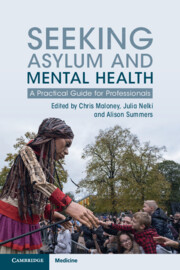Book contents
- Seeking Asylum and Mental Health
- Seeking Asylum and Mental Health
- Copyright page
- Contents
- The Authors
- Foreword
- Acknowledgements
- Glossary
- Introduction
- 1 Why do people seek asylum? The global context
- 2 Seeking asylum in the United Kingdom
- 3 Seeking asylum and mental health
- 4 Access to mental health care
- 5 Assessing mental health needs
- 6 Interpreting assessment findings
- 7 Formulation and diagnosis
- 8 Common diagnoses
- 9 Intervention: the essentials
- 10 Specific interventions
- 11 Children, families, and young people
- 12 Records and reports
- 13 Improving mental health services
- 14 Therapeutic complexity
- 15 Working with people seeking asylum
- Some resources
- Index
- References
4 - Access to mental health care
Published online by Cambridge University Press: 26 August 2022
- Seeking Asylum and Mental Health
- Seeking Asylum and Mental Health
- Copyright page
- Contents
- The Authors
- Foreword
- Acknowledgements
- Glossary
- Introduction
- 1 Why do people seek asylum? The global context
- 2 Seeking asylum in the United Kingdom
- 3 Seeking asylum and mental health
- 4 Access to mental health care
- 5 Assessing mental health needs
- 6 Interpreting assessment findings
- 7 Formulation and diagnosis
- 8 Common diagnoses
- 9 Intervention: the essentials
- 10 Specific interventions
- 11 Children, families, and young people
- 12 Records and reports
- 13 Improving mental health services
- 14 Therapeutic complexity
- 15 Working with people seeking asylum
- Some resources
- Index
- References
Summary
People in the asylum system who might benefit from mental health care frequently find it very difficult to access this.
Some do not seek help, perhaps because they do not expect mental health services to be helpful or because of fear, stigma, or wanting to avoid the processes of help-seeking.Those who do seek help encounter multiple challenges including language barriers, the limitations of health care provision within the asylum system, difficulties negotiating primary care, NHS charges, practical difficulties in getting to a first appointment, and service eligibility criteria. People may face barriers linked to their age, gender, sexuality, or being destitute.
The chapter offers a typology of obstacles to reaching effective mental health care as a step towards considering how these may be addressed.This considers the context (resource limitations /ambivalence about providing equal care) and the sources of specific obstacles, including ‘hostile’ asylum policies. Recurring themes include the need for accessible information,friendly compassionate staff, cultural competence, access to qualified interpreters, appropriately trained staff, and a willingness to be flexible.
Keywords
- Type
- Chapter
- Information
- Seeking Asylum and Mental HealthA Practical Guide for Professionals, pp. 71 - 89Publisher: Cambridge University PressPrint publication year: 2022



